”Everything is good as it leaves the hand of the Creator; everything degenerates in the hand of man” . That celebrated opening sentence of ”Emile” contains all of Rousseau’s thought in germ. All the conclusions he reached , no matter how mutually incompatible they may seem, can be traced to the same point of departure.
He was often cast as the putative father of revolutionists, totalitarians, nudists, and square dancers. Jean Jacques Rousseau ( 1712-1778 ) is a prophet of man’s predicament in an increasingly complex civilization. He had spent the better part of his life as a tramp. He had made enemies of all his friends and spent his final years in a state close to insanity. After achieving fame, he was at the same time hunted like a criminal over the face of Europe and consulted like an oracle. He suffered from every conceivable form of neurosis. Yet, he was an overnight literary sensation with an enduring appeal and pertinence.
Rousseau published in his lifetime, a body of works that contained the most radical and comprehensive social criticism ever formulated up to his time. It was a criticism whose impact on modern society was and remains substantial. The posthumous publication of his ”Confessions” only added to an already weighty dossier of misunderstanding and misrepresentation of his subject. Always his own worst enemy, and endowed with a sure instinct of making enemies of others, he saw to it that he would have a large number of them as long as people read books: The ”Confessions” alone have supplied his detractors with virtually the entire arsenal of weapons they needed to attack him. Rousseau was a victim not only of his enemies and of his mania for self exposure, but also of his most enthusiastic followers.
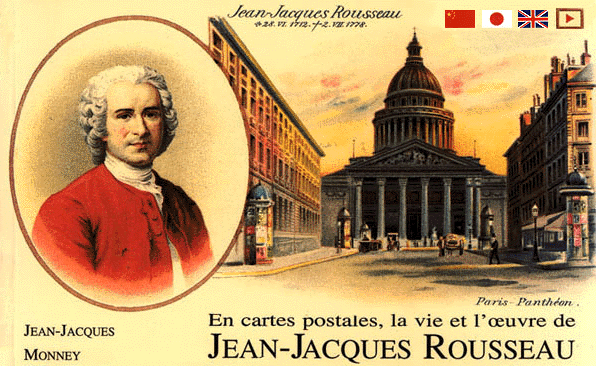
''Men are not made to be crowded together in ant-hills, but scattered over the earth to til it. The more they are massed together, the more corrupt they become....Huddled together like sheep, men would very soon die. Man's breath is fatal to his fellows...Send your children to renew themselves, so to speak, send them to regain in the open fields the strength lost in the foul air of our crowded cities."
Like his detractors, the majority of his admirer’s have obstinately persisted in distorting his thought, much of which has remained misunderstood. He has been both claimed and damned by Marxists and conservatives, by atheists and mystics, by anarchists and totalitarians. He has been blamed, with some plausibility for such disparate developments as the Reign of Terror, Hitlerism, progressive education, romantic love , liberalism, communism, nudism, and momism The myth was greater than the truth, but the misconceptions have become ingrained with time with a distortion and sacrifice of clarity.
Rousseau never preached a ”return to nature” or extolled primitive man as a ”noble savage”. He also did not begin the cult of sensibility. The morbid sensibility of he late eighteenth century; the fashionable fainting fits, floods of tears,suicides, romantic landscaping,and artificial rusticity cannot be imputed to Rousseau, even though those who indulged themselves in these fads claimed him as their patron saint. Artificiality was precisely what he wished to eliminate from men’s lives, and the antics of his misguided followers filled him with misgivings and and scorn. Rousseau lived in an age of experimental science and empiricism, with Bacon, Locke and Newton as its guiding spirits. Voltaire, his adversary, no more rejected feeling than Rousseau rejected reason. What Rousseau did reject was intellectualism and the arrogance that went with it. Finally,he was not the spiritual ancestor of the French Revolution, though Robespierre, for example, was a fanatic Rousseauan even though his political thinking was totally opposite. Robespierre emphasized and invented totalitarian features of Rousseau’s ”Social Contract ” at the expense of its spirit and intention.
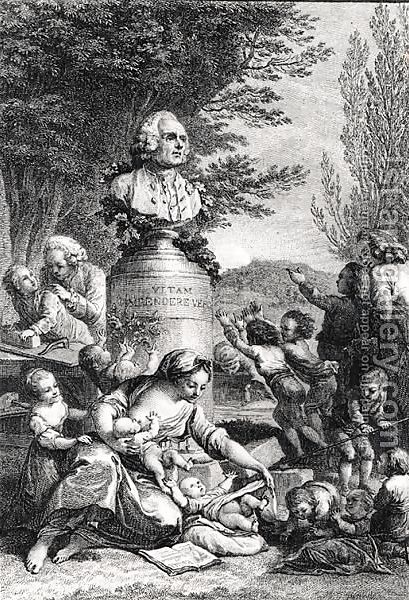
Handmade oil painting reproduction of Frontispiece to 'Emile' by Jean-Jacques Rousseau (1712-78) c.1780, a painting by (after) Cochin, Charles Nicolas II .
From the vantage point of our own time he is a gigantic and tortured figure of modern predicament. Weak, sick in body and mind, perverted, unfit for society, he knew all the distress of the human condition, and he said, in essence, that all human sufferings are brought on him by people, not by God, who has given humanity the means to save itself. This is quite opposed to the Pat Robertson, evangelical preacher’s statements on Haiti: …. on the one side is Haiti on the other is the Dominican Republic,” he said. “Dominican Republic is prosperous, healthy, full of resorts, etc. Haiti is in desperate poverty. Same island. They need to have and we need to pray for them a great turning to god and out of this tragedy….And they got together and swore a pact to the devil. They said, we will serve you if you’ll get us free from the French. True story. And so, the devil said, okay it’s a deal.”
It is the intensely personal, subjective tone of Rousseau’s writings that lends them their force and that sparked the enthusiastic response they received. Regarding himself as both unique and universally human, Rousseau drew all his ideas from subjective experience. It was the misery of his neuroses as much as the brilliance of his genius that made him the prophet of discontent with modern civilization.
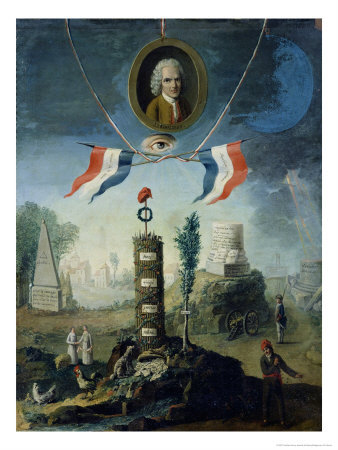 "450" />
"450" />Allegory of the Revolution. Rousseau in medallion
On a summer day in 1749, chance drove him into the career which was to make him both famous and wretched. He was walking to Vincennes to visit his friend Diderot, who was briefly and very comfortably imprisoned there. As he walked he glanced at an announcement in a literary journal he was carrying, and read that the Academy of Dijon had proposed the following subject for its annual prize competition: Whether the restoration of the arts and the sciences has contributed to the purification of morals. Obviously, Rousseau answered the academy’s question in the negative, and thus launched him on his career, or rather accelerated a notoriety of person already well established.
Though over rhetorical, intemperate, and confused, Rousseau‘s ”Discourse” is so passionate and incandescent an indictment of civilization and material progress that even after 250 years it cannot leave the reader indifferent. In many respects, the indictment is not original; yet at the time it appeared, the common view, much like today, was that the civilizing effect of higher living standards, industrial progress, luxury and art would also produce a benficient influence on human conduct.
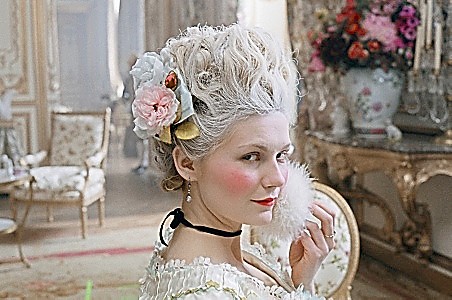
Jean-Jacques Rousseau, wrote about Marie Antoinette who had ignorantly joked about the starving people of Paris but she was only 11 Read more: http://www.dailymail.co.uk/news/article-1022943/No-Lady-Godiva-wasnt-starkers-apple-didnt-really-fall-Isacc-Newtons-head--reveal-historical-myths.html#ixzz0ctCK916E
”It is useless to ask what is the source of natural inequality, because that question is answered by the simple definition of the word. Again, it is still more useless to inquire whether there is any essential connection between the two inequalities; for this would be only asking, in other words, whether those who command are necessarily better than those who obey, and if strength of body or of mind, wisdom or virtue are always found in particular individuals, in proportion to their power or wealth: a question fit perhaps to be discussed by slaves in the hearing of their masters, but highly unbecoming to reasonable and free men in search of the truth.The subject of the present discourse, therefore, is more precisely this. To mark, in the progress of things, the moment at which right took the place of violence and nature became subject to law, and to explain by what sequence of miracles the strong came to submit to serve the weak, and the people to purchase imaginary repose at the expense of real felicity.”( Discourse )
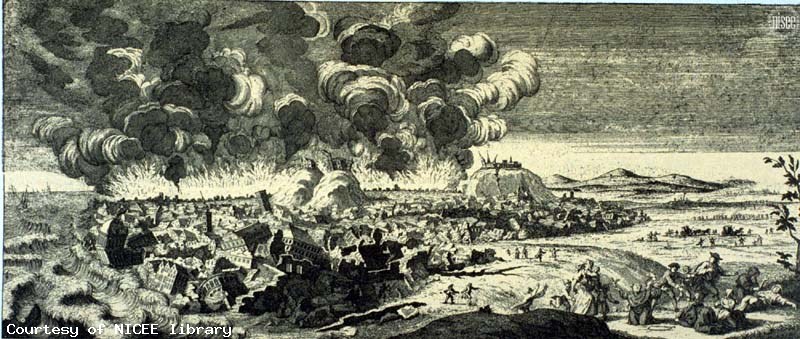
''Lisbon seen from the east during the earthquake. Exaggerated fires and damage effects. People fleeing in the foreground. (Copper engraving, Netherlands, 1756) - Image and caption courtesey of the National Information Service for Earthquake Engineering image library''
Rousseau’s ”Discourse on the Sciences and the Arts” won the first prize it deserved. The thesis that no one cared for reality and everyone staked their essence on illusion, catapulted his literary career and made him a virtual overnight sensation. Rousseau touched a raw nerve and captured the imagination on a poetic discourse that singled out humanity as being slaves and dupes of their self-love , and living not in order to live, but to make others believe they have lived.
”The philosophers, who have inquired into the foundations of society, have all felt the necessity of going back to a state of nature; but not one of them has got there. Some of them have not hesitated to ascribe to man, in such a state, the idea of just and unjust, without troubling themselves to show that he must be possessed of such an idea, or that it could be of any use to him. Others have spoken of the natural right of every man to keep what belongs to him, without explaining what they meant by belongs. Others again, beginning by giving the strong authority over the weak, proceeded directly to the birth of government, without regard to the time that must have elapsed before the meaning of the words authority and government could have existed among men. Every one of them, in short, constantly dwelling on wants, avidity, oppression, desires and pride, has transferred to the state of nature ideas which were acquired in society; so that, in speaking of the savage, they described the social man.”
Rousseau was accused of attacking the arts and sciences and of wanting men to go back walking on all fours. Rousseau claimed that if the arts and sciences had failed to make men happier or more virtuous, the fault was not theirs but must be sought in the social institutions which perverted their ends. Rousseau said that social institutions, almost everywhere and at all times, rest not on true law, but on power; laws and conventions aim to consolidate the wealth and power of the few, creating a class of dependent ”have-nots”. The dependency, mutually exclusive and disconnected, being a major source of violence. This in part, the result of people thinking, acting and striving, not according to their own conscience and nature, but according to the artificial standards of society.
A situation similar to Pat Robertson, earthquakes and God was previously invoked in a heated exchange between Voltaire and Rousseau in 1755 regarding the Lisbon earthquake and its supplementary concept of ”children of a lesser god” . Voltaire questioned the belief of a benevolent God or Providence that was free, just and clement since humankind suffered so greatly under such a mild master. In reply, Rousseau pointed out that if people did not insist on gathering in large cities and on dwelling in shoddily constructed six story buildings, disasters on the scale of the Lisbon earthquake would be statistically less likely to occur. Essentially, this was the thorny theological question of ”why does God allow bad things to happen to good people”, of which there is no unambiguous answer…yet. Rousseau went further. Disbelief in God or the possibility of a cruel and unjust god who was arbitrary and chose sides, was utterly unacceptable. Voltaire’s reply was ”Candide” which left the question unanswered.
”All the subtleties of metaphysics would not lead me to doubt for a moment the immortality of my soul or a spiritual providence. I feel it, I believe it, I desire it, and I will defend it to my last breadth. …in this strange contrast between what you prove and what I feel, I beg you to relieve my anxiety and to tell me where the deception lies, whether on the side of feeling or of reason”. ( Rousseau)
The institution of religion, to Rousseau, was based on wealth and the renouncing of freedom and many faulty premises.Philosophy and theology, Rousseau contended, in all the thousands of years of their existence, have led us nowhere. Humankind, he said, cannot be certain of anything except what they feel; reason and feeling must never be in conflict, but since reason is subject to error, it must always be controlled by feeling. The paradox disappears if one realizes that by ”feeling” in this context, Rousseau always means ”conscience”. This despite, or in spite of fire, brimstone, hell,blackmail,the devil, and various and sundry other forms of moral suasion and entreaties to self immolation:
“There is no one righteous, not even one; there is no one who understands, no one who seeks God. All have turned away, they have together become worthless; there is no one who does good, not even one. Their throats are open graves; their tongues practice deceit. The poison of vipers is on their lips. Their mouths are full of cursing and bitterness. Their feet are swift to shed blood; ruin and misery mark their ways, and the way of peace they do not know. There is no fear of God before their eyes.” Every human being on this planet deserves to be thrown into hell at this very moment. Every second we spend alive is only by the grace and mercy of God. Even the most terrible misery we could experience on this planet is merciful compared to what we deserve, eternal hell in the lake of fire.” ( Romans: 3:10 )
”Rousseau closes his Social Contract with a chapter on “civil religion.“ Roman Catholic Christianity he regarded as very noxious to the state; even the Chris tianity that he discovered in the Gospels, which he pro fesses to admire, did not, he believed, help to make good citizens, but rather the contrary.”


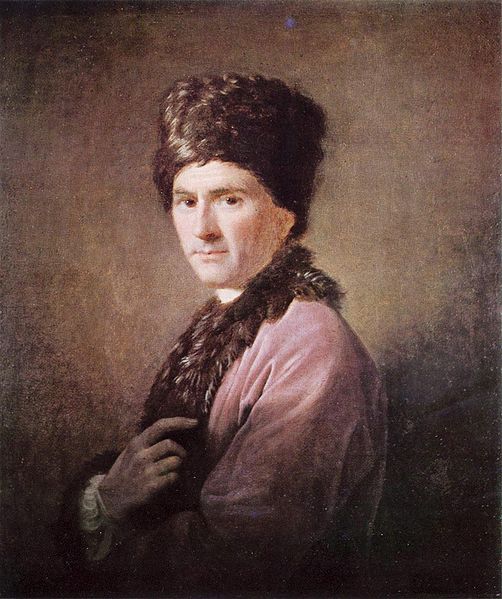



 COMMENTS
COMMENTS
The truth is that they did make a pact with the devil.
Now the significance you put on that pact I guess has to do with whether you believe the devil is real or not.
But it is one of Haiti’s founding myths.
http://muse.jhu.edu/login?uri=/journals/small_axe/v009/9.2laroche.html
According to Haitian national history, the revolutionary war was launched on the eve of a religious ceremony at a place in the north called Bwa Kayiman (Bois Caiman, in French). At that ceremony on August 14, 1791, an African slave named Boukman sacrificed a pig, and both Kongo and Creole spirits descended to possess the bodies of the participants, encouraging them and fortifying them for the upcoming revolutionary war. Despite deep ambivalence on the part of intellectuals, Catholics, and the moneyed classes, Vodou has always been linked with militarism and the war of independence and, through it, the pride of national sovereignty.
So, yeah if there is a devil, Haiti made a pact with it. Might explain why even though Haiti and the Dominican Republic share the same island, the Dominican Republic has been far more successful.
you are probably right to some degree. However, the risk of simplification is fraught with problems. Robertson’s term of the ”devil” is anything outside his field of interest and ambition. I will be going into more detail on this soon. thanks for reading! and feel free to comment again. If voudou has been linked with militarism, what is linked with American militarism?